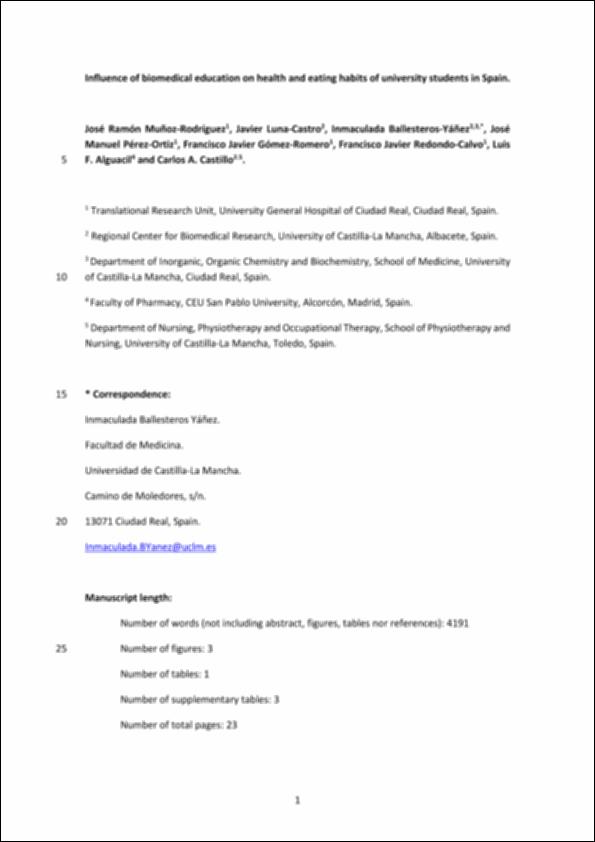Por favor, use este identificador para citar o enlazar este ítem:
http://hdl.handle.net/10637/15389Influence of biomedical education on health and eating habits of university students in Spain
| Título : | Influence of biomedical education on health and eating habits of university students in Spain |
| Autor : | Muñoz Rodríguez, José Ramón Luna Castro, Javier Ballesteros Yáñez, Inmaculada Pérez Ortiz, José Manuel Gómez Romero, Francisco Javier Redondo Calvo, Francisco Javier Alguacil Merino, Luis Fernando Castillo, Carlos A. |
| Materias: | Dietary habits; Food addiction; Healthy eating; Lifestyle factors; Self-reported questionnaires; University students |
| Editorial : | Elsevier |
| Citación : | Muñoz-Rodríguez JR, Luna-Castro J, Ballesteros-Yáñez I, Pérez-Ortiz JM, Gómez-Romero FJ, Redondo-Calvo FJ, Alguacil LF, Castillo CA. Influence of biomedical education on health and eating habits of university students in Spain. Nutrition. 2021 Jun;86:111181. doi: 10.1016/j.nut.2021.111181. |
| Resumen : | Objective: The aim of this study was to explore the influence of an enrolled degree course on health and eating habits in a population of Spanish university students (17-26 y of age). Methods: A cross-sectional observational study was carried out with 648 students. Volunteers were stratified into biomedical (medicine and nursing, 48%) and non-biomedical students (other fields of study, 52%). Data were collected using previously self-reported questionnaires focused on anthropometric and sociodemographic profile, lifestyle practices, body image perception, health consciousness, eating habits, physical activity, and food addiction. Mann-Whitney U tests and Pearson's χ2 tests were applied to identify associations between the two groups. Results: Self-reported body mass index was higher for the non-biomedical group (22.1 ± 3.1 versus 23 ± 5 kg/m2; P < 0.05), which also reported less regularity in taking meals (91 versus 95%; P < 0.05), eating fewer colored vegetables and fruits (65 versus 77%; P < 0.001) and a higher alcohol intake (27 versus 20%; P < 0.001). In contrast, the proportion of students that showed more interest in the diet-health duality (92 versus 85%; P < 0.001) and a desire to adopt healthier habits (80 versus 78%; P < 0.05) was larger in the biomedical group. Dietary habits, obtained by means of a food frequency questionnaire, suggested that biomedical students make healthier food choices. Additionally, the group of biomedical students took more walks per week (5.8 ± 1.8 versus 5.5 ± 1.9; P < 0.05). Conclusions: Healthier lifestyle factors cluster into the biomedical group in various components of the study, except food addiction where no differences were observed. The data presented here suggest the necessity to develop health promotion strategies targeting university students. |
| Descripción : | Se enlaza al texto a través del doi 10.1016/j.nut.2021.111181 |
| URI : | http://hdl.handle.net/10637/15389 |
| Derechos: | http://creativecommons.org/licenses/by-nc-nd/4.0/deed.es |
| ISSN : | 0899-9007 |
| Fecha de publicación : | jun-2021 |
| Centro : | Universidad San Pablo-CEU |
| Aparece en las colecciones: | Facultad de Farmacia |
Los ítems de DSpace están protegidos por copyright, con todos los derechos reservados, a menos que se indique lo contrario.


